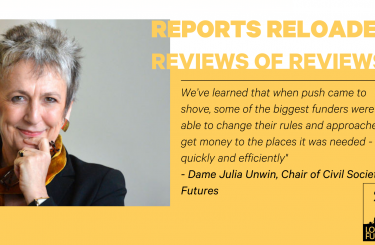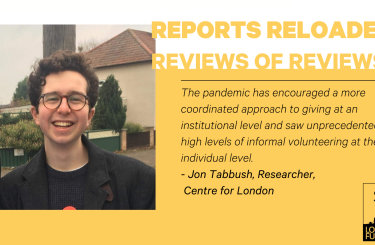

As our other contributors have reflected over the past few weeks, there is much from the 2019 Review of Reviews that seems just as relevant to today’s discussions around the conditions needed for a strong civil society.
My reflections will focus on the insights generated from the Office for Civil Society’s review of place based giving schemes, which came as a prelude to the government’s 2020 investment of over £700k in the growth of place based giving schemes across the country. This provided yet more impetus to test how this approach can stimulate local philanthropy and strengthen civil society.
I joined London Funders at end of 2020, a relative newcomer to the world of place based giving. I quickly understood the answer to the question of what place based giving is (complicated…) and what it isn’t (just another form of grant making...). A year on, and after much time spent delivering our programme of work with the brilliant people in the London’s Giving network, I now have a much more nuanced appreciation about why this approach is different, and moreover how many of the principles outlined in the 2019 Review have not just come to life, but flourished during this subsequent time of adversity.
We would argue that place based giving should absolutely be about shifting power, about giving it up and supporting others to find theirs.
We saw for example how schemes acted as a new platform for ‘giving’ to the local community during covid, when growth accelerated and many played a key role in leveraging new resources to support their local community in a time of crisis. At a time when many of us were at our most isolated, local giving schemes could tap into our desire to re-establish feelings of community and our need for human connections with those around us. And of course, they’ve shown that place based giving is much more than giving money. Some schemes are equally concerned with creating a platform for local advocacy, finding ways to strengthen grassroots action beyond money, and challenging others to do the same.
We continue to share the ambition that collaboration must be more inclusive – one that embraces business, grassroots activism, statutory and community partners.
The 2019 Review also made a strong point about the importance of collaboration, arguing that it is only through creating this ‘non-hierarchical culture’ of cross-sector collaboration that we can realise a vision of a strong civil society. This is hard to get right, but it’s something our network continues to explore and test. We continue to share the ambition that collaboration must be more inclusive – one that embraces business, grassroots activism, statutory and community partners. We’ve seen through London’s Giving that the time to grow and nurture this collaboration really pays off – and often in ways that are not expected.
The 2019 Review rightly drew out some of the challenges that place based giving faced then– the inertia which can result from a lack of development capacity and the challenges of investing in long-term partnerships with business are just two which many schemes still grapple with. But many of these challenges are operational and although capacity is still a strain for some, there is growing confidence that as a network we have the tools and knowledge to deal with them.
I’d argue that the far bigger challenge is how place based giving can really grab hold of the notions of Power, Accountability, Connection and Trust (PACT) proposed in the then new framework put forward by the Civil Society Futures inquiry, and which Julia Unwin reflects on in an earlier blog in this series. We would argue that place based giving should absolutely be about shifting power, about giving it up and supporting others to find theirs. Some of the recommendations made by the Inquiry – not least that funding should be decided by the people it is there to support, and those with direct experience of the issue valued as experts - are ones which schemes in our network are trying to test and put into practice. For some this means tentative steps, for others radical change. Whatever the route, there is much to learn for us all.
The ideas of creating different types of connections and relationships based on trust are key if place based giving schemes are to succeed.
Some in the network are also grappling with how to create new lines of accountability to local people, moving away from traditional funder/grantee roles. We’re having more conversations about redesigning accountability practices and how these can be more equitable. Nobody has the answer yet, but these propositions feel even more relevant three years on. And finally, the ideas of creating different types of connections and relationships based on trust are key if place based giving schemes are to succeed.
At London Funders we’re keen to ensure place based giving becomes part of the wider funding and giving eco-system, as well as our wider conversations about place. As the 2019 Review said, we need to evidence the added value from place based approaches, whilst recognising ‘the particular challenges of place based funding in a London context’. It drew together lessons around the three pillars of ‘Place, People and Philanthropy’. Place based giving cuts across all of these, and done well, has the potential to bring to life so many of the ambitions outlined here for a strong civil society. We’re looking forward to working with our members and networks involved in the place based giving movement to continue towards this ambition.


